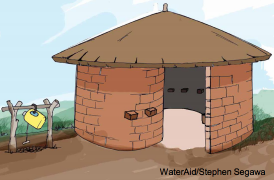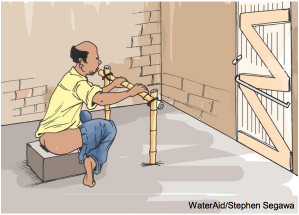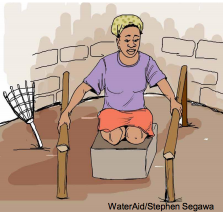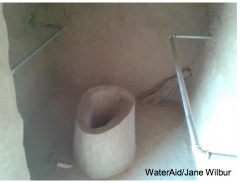| Construction
|
Advantages
|
Disadvantages
|
Improvements / variations
|
Cost / labour
|
Bricks protruding from wall for support to a weak or visually impaired person

|
- Easy to construct
- Materials locally available
|
- Walls must be strong enough to support user’s weight
- Difficult to add after construction
- Regular maintenance needed to ensure stability
|
- Half bricks in the wall can also provide mini-ledges for a user to hold on to
|
Low
|
| Wooden/ bamboo support rails fixed to floor either in front or on either side of toilet (depending on user’s needs)
|
- Materials locally available
- Easy to construct and maintain
- Allows user to transfer to the toilet from the side
- Position and height of rails must involve user and an assessment of their need
|
- Rails must be strong enough to bear users’ weight
- Not possible to fix to a concrete floor/slab
- Might be difficult to keep clean
- Cannot fix to a concrete floor/slab
|
- Varnish/paint rail to stop termite damage and for easy cleaning
- For a growing child use longer vertical poles, so bar height is adjustable.
- Horizontal bars at different heights might suit some.
- For concrete floors, pipe rails can be cemented in during construction, or screwed to floor later.
|
Low
|
| Metal bars (e.g. galvanised iron pipe) fixed to side wall/s of latrine
|
- Highly durable
- Can be added to existing facility
- Easy to clean
- Bars to be positioned based on user needs
|
- Walls must be strong enough to fix bars to
- Walls must be close enough for user to reach the bars
|
- Paint bars to reduce corrosion and increase durability
- Several bars at different heights on each side might better suit some users
|
Medium to high
|





